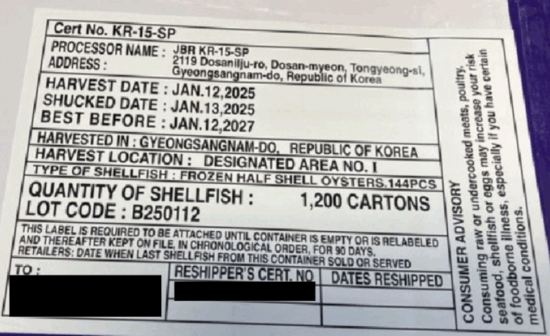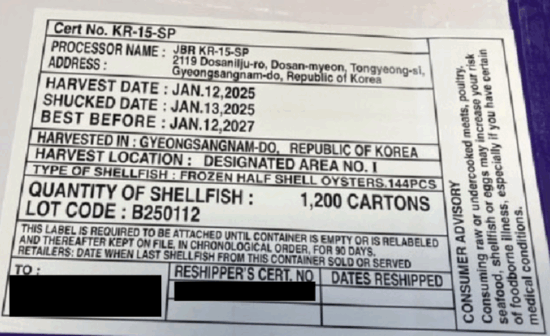

The FDA announced today that on July 16, the Utah Department of Agriculture and Food informed it of an outbreak of norovirus illnesses associated with consumption of certain oysters from the Republic of Korea.
The FDA has issued a public warning about the oysters. Businesses can identify the implicated frozen, raw, half-shell oysters processed by JBR KR-15-SP by looking for the following label information: harvested on Jan. 12, 2025, from harvest area Designated Area No. 1 in the Republic of Korea (ROK). The implicated products include Lot Code: B250112. The frozen, raw, half-shell oysters were distributed to restaurants and retailers in Arizona, California, Colorado, Montana and Utah and may have been distributed to other states as well, according to the FDA.
Restaurant and grocery store patrons should ask whether the oysters they are considering buying are from the implicated harvest area and whether they have the affected lot number. If the seller cannot provide the information, the oysters should not be purchased or eaten.
There is concern that businesses may still have the oysters in their freezers because their use-by dates run into 2027.
Wang Globalnet of Vernon, CA, has recalled the implicated frozen, raw, half-shell oysters.
The FDA is awaiting further information on distribution of these frozen, raw, half-shell oysters and will continue to monitor the investigation and provide assistance to state authorities as needed.
About norovirus infections
Food and beverages contaminated with norovirus may not look or smell bad, but it can cause severe illnesses.
Symptoms of norovirus infection may include vomiting and/or diarrhea, nausea, muscle aches, fever, and headache, according to the Centers for Disease Control and Prevention. Symptoms typically start 12 to 48 hours after exposure and can last for one to three days. Most people recover without treatment, however some may need medical attention for dehydration.
People with norovirus infections can spread the infection easily to others. The virus can live on surfaces for long periods of time.
To prevent others from getting sick always wash hands carefully with soap and warm water after using the bathroom or changing diapers. Use soap and water to clean toilets or other areas that may be soiled with stool or vomit. Hard surfaces can be disinfected with 1/3 cup household bleach mixed with one gallon of water – always wear gloves when handling bleach-based cleaners.
(To sign up for a free subscription to Food Safety News, click here)
























